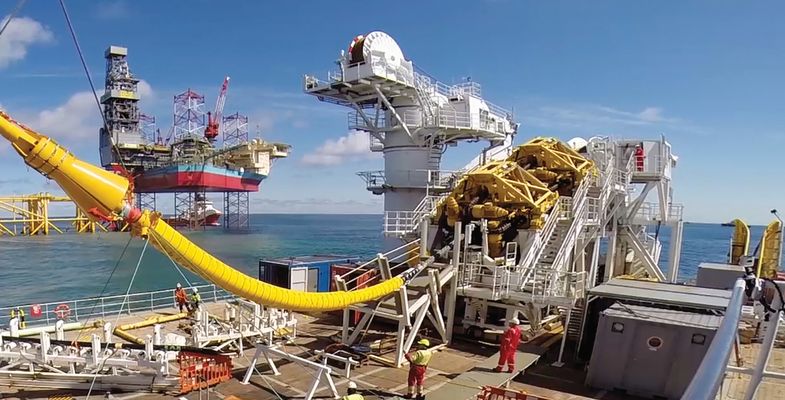UL 2556 Mechanical Performance Testing of Offshore Cables
The UL 2556 standard is a crucial benchmark in the energy and renewable energy sector, providing stringent guidelines for ensuring that offshore cables can withstand the harsh marine environment. This testing protocol evaluates mechanical performance under conditions that simulate real-world stresses such as bending, twisting, and tension forces. Offshore platforms and subsea installations demand robust infrastructure to ensure reliability and safety. Mechanical integrity is paramount in preventing failures that could lead to catastrophic consequences like cable breaks or electrical shorts.
The UL 2556 test involves subjecting the cables to a series of mechanical stress tests designed to mimic the dynamic loading conditions they will experience during installation, operation, and maintenance. The testing apparatus includes specialized fixtures capable of applying controlled forces that simulate real-world scenarios such as ship tugging or anchor movement. These fixtures are calibrated to replicate the forces exerted by various marine activities.
The test protocol typically involves multiple stages, each designed to assess specific aspects of cable performance:
- Bending Test: This stage evaluates how well the cable can handle repeated bending without compromising its integrity. The cable is subjected to a series of bends and counter-bends under controlled conditions.
- Twisting Test: Here, the cable undergoes twisting forces that simulate the effects of anchor movement or other dynamic loads. This test assesses the cable's ability to maintain electrical continuity despite rotational stress.
- Tension Test: In this phase, the cable is stretched beyond its usual operational limits to determine its breaking point and elongation characteristics. This helps identify any weak points in the cable that could lead to failure under extreme conditions.
- Impact Loading Test: This test simulates the effects of sudden impacts such as those caused by collisions with objects or debris. The cable is subjected to a series of impact loads to assess its resilience and ability to recover from damage without compromising electrical performance.
The acceptance criteria for UL 2556 are stringent, ensuring that only cables meeting these standards can be approved for use in offshore applications. Compliance with this standard not only enhances the safety of marine operations but also ensures regulatory compliance across international jurisdictions.
Real-world application of this testing protocol is critical for maintaining high levels of reliability and performance in offshore installations. For instance, the cable's ability to withstand bending can prevent failures during installation or maintenance, while its resilience to impact loads ensures continued operation even after potential damage from external sources. By adhering to UL 2556, manufacturers and operators contribute significantly to the overall safety and efficiency of marine operations.
Moreover, compliance with this standard is essential for ensuring that cables can operate effectively in challenging environments where environmental factors like temperature fluctuations, saltwater exposure, and pressure variations play significant roles. The mechanical performance testing ensures that these conditions do not compromise the cable's structural integrity or electrical conductivity.
Eurolab Advantages
As a leading laboratory in energy and renewable energy testing, Eurolab offers unparalleled expertise and advanced facilities tailored to meet the rigorous requirements of UL 2556 mechanical performance testing. Our state-of-the-art equipment ensures precise and accurate testing results that are essential for maintaining quality control and regulatory compliance.
- Advanced Testing Facilities: We possess cutting-edge testing apparatus capable of simulating a wide range of marine conditions, providing reliable data to support your product development and certification needs.
- Expert Technical Team: Our team comprises highly skilled professionals with extensive experience in energy sector testing, ensuring that each test is conducted with the highest level of expertise and precision.
- Dedicated Compliance Support: We offer comprehensive support for navigating regulatory requirements, helping you ensure that your products meet all necessary standards before certification.
- Comprehensive Reporting: Our detailed reports provide clear insights into test results, highlighting any areas where improvements are needed to enhance product performance and reliability.
By leveraging Eurolab's advanced testing capabilities and experienced team, you can be confident that your offshore cables will meet the highest standards of mechanical integrity and safety. This ensures not only regulatory compliance but also enhanced performance and reliability in challenging marine environments.
Customer Impact and Satisfaction
Our clients benefit significantly from our UL 2556 mechanical performance testing services, which enhance product reliability and compliance. By ensuring that cables meet the highest standards of safety and performance, we contribute to customer satisfaction through improved product quality.
- Enhanced Product Reliability: Our rigorous testing protocols ensure that your offshore cables can withstand harsh marine environments without compromising their integrity or electrical performance.
- Improved Compliance: By meeting UL 2556 standards, you avoid costly delays and penalties associated with non-compliance. This ensures smooth regulatory approval processes.
- Increased Customer Confidence: Demonstrating compliance with international standards boosts customer confidence in the quality of your products.
- Cost Savings: Early identification of potential issues through testing can prevent costly repairs and replacements, thereby reducing long-term operational costs.
We are committed to delivering high-quality services that meet our customers' needs. Our comprehensive approach ensures that every aspect of the testing process is conducted with precision and attention to detail, leading to satisfied clients who trust in our expertise and reliability.
International Acceptance and Recognition
The UL 2556 standard enjoys widespread recognition across various international jurisdictions. Its stringent requirements ensure that offshore cables meet the highest standards of performance and safety, which is critical for operations in challenging marine environments.
Compliance with this standard not only enhances product reliability but also facilitates smoother regulatory approval processes. Many countries have adopted UL 2556 as a benchmark for ensuring the mechanical integrity of offshore cables, reflecting its global acceptance and significance.
The international recognition of UL 2556 is further underscored by its alignment with other leading standards such as IEC, ISO, and ASTM. This ensures that products certified to meet these standards are universally accepted in marine installations worldwide.





